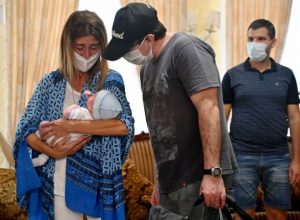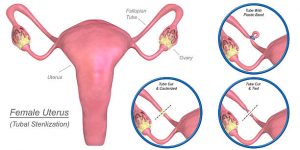Infertility is defined as the inability to conceive after 12months of unprotected and regular (3 times per week) sexual intercourse. It is the inability to become pregnant after having regular sexual intercourse without the use of any family planning method for a year.
It is not limited to women, the man or the woman can be the cause of infertility of a couple.
For a woman to get pregnant, the following must happen:
1. Ovulation (release of a mature egg from an ovary during the mid point of the menstrual cycle)
2. Fertilization (fusion of an egg and a sperm to form a diploid cell called zygote)
3. Transportation(movement of a fertilized ovum through a fallopian tube towards the uterus)
4. Implantation(attachment of the fertilized egg to the inner linings of the uterus)
Once there is a problem with any of the mentioned processes, the woman may not be able to get pregnant.
CAUSES OF INFERTILITY
Photocredit: gettyimages.com
Infertility in men is usually as a result of low sperm count or sperm abnormalities or ejaculation problems.
Causes of low sperm count
• Hormone disorder
• Exposure to toxic chemicals
• Overexposure to heat
• Genetic condition/hereditary
• Tobacco, alcohol and marijuana use
• Injury to the groin area
• Bacterial or viral infections
Causes of sperm abnormalities
• Testicular inflammation
• Enlarged veins in the scrotum
• Abnormally developed testicles
Causes of ejaculation problems
• Injury to the reproductive organs
• Genetic diseases
• Premature ejaculation
• Retrograde ejaculation (Movement of sperm into the bladder instead of coming through the penis during ejaculation)
IN WOMEN,
Photocredit: gettyimages.com
Infertility in women occurs as a result of ovulation problems, damage to fallopian tubes or uterus and cervix problems.
Causes of ovulation problems
• Stress
• Overweight
• Hormonal issues
• Poor diet
• Exposure to certain chemicals and toxins i.e. alcohol, tobacco smoke, Marijuana, pesticides, overheat and chemotherapy
• Diabetes
• Congenital diseases
• Effect of certain medications
• Intense/vigorous exercise
Causes of fallopian tube/uterus damage
• Chronic illness
• Pelvic inflammatory disease
• Birth defect
• Fibroids
• Previous ectopic pregnancy
• Effect of DES (Diethylstilboestrol): DES is a medication given to pregnant women so as to prevent miscarriage or premature birth and this can cause fertility problems for the children.
• Scarring from prior surgery or pelvic infections
Causes of cervix problems
• Abnormal cervical mucus
FACT: Fertility rate decreases with age.
DIAGNOSIS
Infertility can be diagnosed through thorough physical examination, radiological investigations, blood test, sperm analysis (for men) and egg analysis (for women) and previous medical history.
THE WAY-OUT
FOR MEN,
1. Some medications can be used to increase sperm production
2. Hormonal drugs prescribed by a physician can be used to improve hormonal imbalance
3. Long and hot showers, tubs or saunas should be avoided
4. Use of antibiotics to properly treat infections
5. Loose underwear should be worn as tight ones should be discarded
6. Fertility supplements for men can be taken
7. Illicit drugs should be avoided
8. Radiation and extreme heat should also be avoided
9. Heavy or frequent use of alcohol should be avoided
FOR WOMEN,
1. Fertility supplements for women can be taken
2. Vigorous exercise should be avoided
3. Hormonal drugs prescribed by a physician can be used to improve hormonal imbalance
4. Pelvic infections should be properly treated
5. Illicit drugs should be avoided
6. Radiation and should also be avoided
7. Heavy or frequent use of alcohol should be avoided
8. Good diet plan should be maintained
SCIENTIFIC METHODS THAT CAN BE USED TO TREAT INFERTILITY
1. Artificial/intrauterine insemination:
This method can be used when the sperm count of the man is low. The sperm is collected and then placed in the woman’s uterus.
2. In-vitro fertilization(IVF):

Egg storage for in vitro fertilisation (IVF). Tube of eggs in cryogenic (frozen) storage(photocredit:gettyimages.com)
An egg is removed from the woman’s ovary and then, it is fertilized with a sperm in the laboratory. After the egg has been fertilized, it is called an embryo and it is returned to the woman’s womb to grow.
3. Sperm and egg donation:
Photocredit: gettyimages.com
When there is a case of infertility with absent or non-functional gonads (testis and ovary) especially in congenital diseases. The partner can receive sperm from a donor to help her conceive. This also applies to women.
4. Surrogacy:

Argentinian Andrea Viez (L) and her husband react as they collect their son in the hotel Venice in the Ukrainian capital of Kiev on June 10, 2020.(photocredit:gettyimages.com)
If a woman is infertile, a fertile woman can be asked to help carry the baby. The sperm of spouse of the infertile woman will be collected and will be artificially inserted into the fertile woman’s uterus or fallopian tubes. Then, the fertile woman will carry the baby throughout the period of pregnancy and once she delivers the baby, the baby will be given to the couple.
5. Medications:
There are drugs used in some specific causes of infertility. They include:
• Gonadotrophins
• Tamoxifen
• Clomiphene
• Metformin
6. Fallopian tube surgery:

Female Human Uterus including Tubal Sterilization Procedures. Including Tied tubes, cauterized tubes and reversible plastic band.(photocredit: gettyimages.com)
Surgery is needed when the fallopian tubes are blocked or scarred. The surgery can be used to open up the scarred tissue in the fallopian tubes thereby, making it easier for eggs to pass through. The success of this surgery depends on the damage extent to the fallopian tubes. Possible complication that may arise from this surgery is Ectopic pregnancy(implantation of fertilized ovum outside the uterus).
WARNING: SELF-MEDICATION IS DANGEROUS. SEE YOUR DOCTOR PLEASE.

Aanuoluwapo is a nursing student of Bowen university. She desires to be a caregiver for people and helps to manage physical needs, prevent illness, and treat health conditions.







